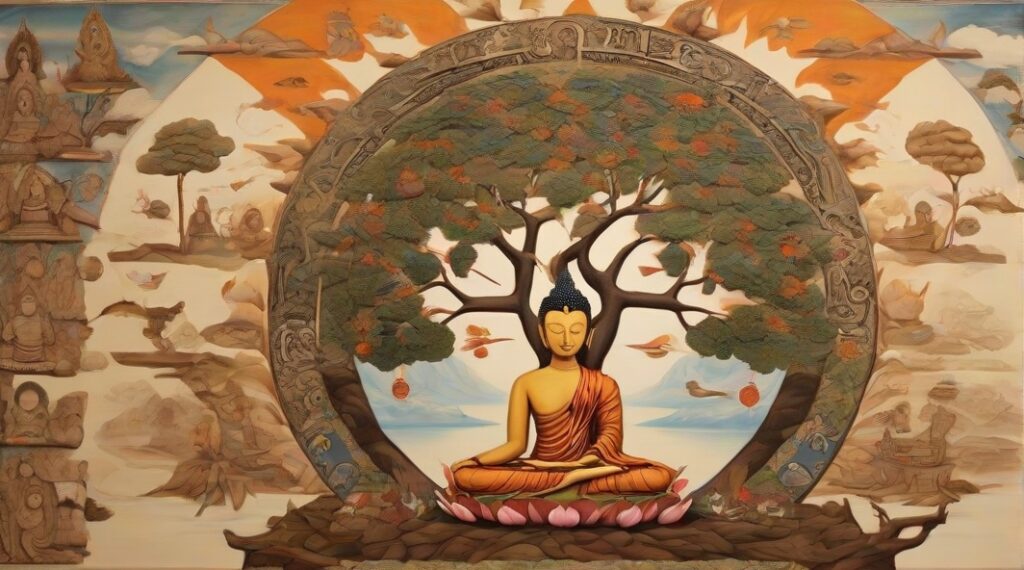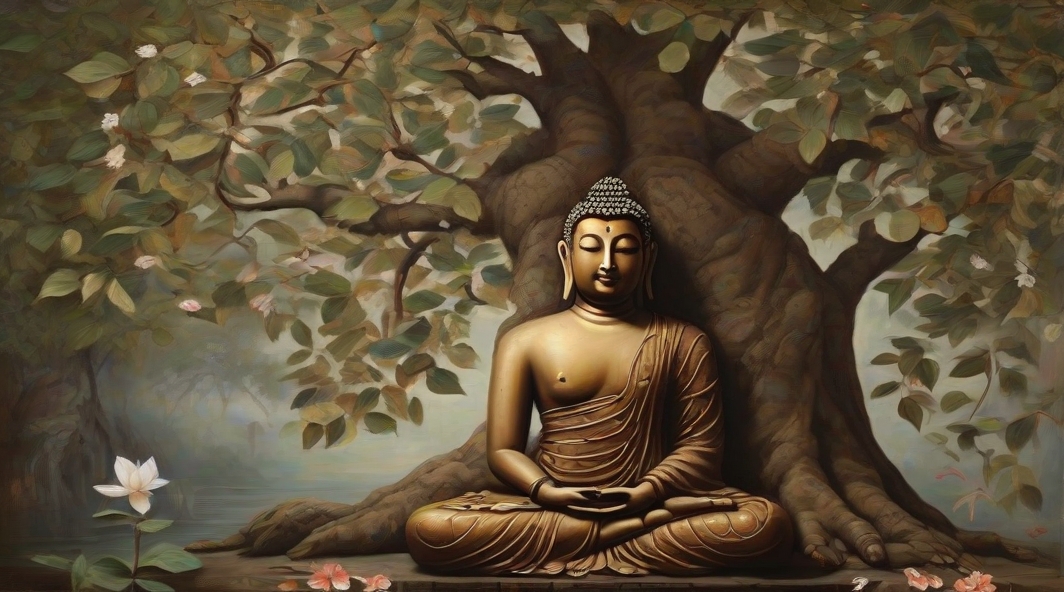What will be the end of a terrible war? What does Lord Buddha say about this?
The world has been plagued by countless wars throughout history, each one bringing destruction, loss, and suffering. In the midst of these conflicts, people often seek solace and guidance, turning to spiritual leaders and teachings for answers. Lord Buddha, the founder of Buddhism, offers profound insights on the nature of war and the path to its end. In this article, we will explore what Lord Buddha has to say about the end of a terrible war and the wisdom contained in his teachings.
Buddha’s Teachings on Conflict and War

Lord Buddha’s teachings are rooted in the pursuit of peace and the alleviation of human suffering. He emphasized the Four Noble Truths, which acknowledge the existence of suffering, its cause, the possibility of its cessation, and the path to that cessation. These teachings provide a foundation for understanding the nature of war and conflict.
- The Nature of Suffering: Lord Buddha taught that suffering is an inherent part of the human experience. War and conflict are extreme manifestations of this suffering, causing immense pain and destruction.
- The Cause of Suffering: Buddha identified attachment, desire, and ignorance as the root causes of suffering. Wars often arise from human desires, such as greed, power, and territorial disputes.
- The Cessation of Suffering: Buddha’s teachings offer a path to the cessation of suffering through ethical conduct, mental discipline, and wisdom. Applying these principles can help individuals and societies work towards the end of war.
- The Eightfold Path: This path, a core component of Buddha’s teachings, outlines a way of life that includes right understanding, right intention, right speech, right action, right livelihood, right effort, right mindfulness, and right concentration. By following this path, one can lead a life that promotes peace and harmony.
Buddhism and the End of War
Buddhism, with its emphasis on non-violence and compassion, holds the potential to contribute significantly to the end of wars and conflicts. While Buddhism may not explicitly address the tactics and strategies of warfare, its principles can guide individuals and societies towards peace. By embracing these principles, we can better understand how to end terrible wars:
1. Inner Peace: Lord Buddha taught that inner peace is the foundation of outer peace. By cultivating a calm and compassionate mind, individuals can influence their communities and societies positively.
2. Non-Violence (Ahimsa): The principle of non-violence is central to Buddhism. Lord Buddha’s teachings encourage the resolution of conflicts through dialogue and understanding, rather than through aggression and war.
3. Compassion: Compassion towards all sentient beings is a fundamental aspect of Buddhist philosophy. By extending this compassion to all, we can work towards reconciliation and forgiveness, even in the most challenging of conflicts.
4. Mindful Conflict Resolution: Mindfulness, a key component of Buddhism, teaches us to be aware of our actions and their consequences. This awareness can lead to more thoughtful and constructive approaches to resolving conflicts.
5. Cultivating Wisdom: Buddha’s teachings emphasize wisdom as a means to overcome ignorance and delusion. Wisdom can guide us to make choices that prevent war and promote harmony.

In the quest for the end of terrible wars, it is crucial to remember that Buddhism offers a valuable perspective and practical tools to address the underlying causes of conflict. While the world may not achieve immediate peace, the path to ending wars begins with individuals adopting the principles of Buddhism and working together to create a more peaceful and compassionate world.
Lord Buddha’s teachings on suffering, its causes, and the path to its cessation provide a valuable framework for understanding and ultimately ending terrible wars. By incorporating the principles of Buddhism into our lives and societies, we can move towards a more peaceful and harmonious world, in line with the wisdom of one of history’s great spiritual leaders.
For further exploration of spiritual and philosophical topics, you can visit our article to learn more about the various dimensions of spirituality.
Additionally, understanding the different levels of spirituality is essential in unraveling the profound wisdom within Lord Buddha’s teachings. Delve deeper into the spiritual journey by exploring the seven levels of spirituality. Each level represents a step towards greater self-awareness and spiritual growth.
While Buddhism is a spiritual path in itself, it’s also crucial to consider the interplay between spirituality and religion. Buddhism, often considered a spiritual practice, can also be examined from a religious perspective. Explore the relationship between Buddhism and spirituality by visiting our page on is Buddhism a religion or spirituality. This will provide you with a more comprehensive understanding of where Buddhism fits into the spectrum of spiritual and religious beliefs.
Moreover, understanding the roots of different religions and their views on war can shed light on how spiritual teachings have influenced human history. Investigate the origins of various belief systems and their historical contexts in our article on which religion came first. This historical exploration will help you gain a broader perspective on the role of spirituality in human civilization.
To delve deeper into Lord Buddha’s specific views on the concept of deity, visit did Buddha believe in God. This discussion will provide insights into Buddhism’s unique perspective on the divine and how it relates to the broader concept of spirituality.
While Buddhism is one of the ancient and well-established religions, there are newer spiritual movements and practices emerging worldwide. Investigate the most recent spiritual trends and beliefs by visiting our article on the newest and youngest religions around the world. This exploration will help you understand the evolving landscape of spirituality in the contemporary world.
Lord Buddha’s teachings offer valuable insights into the end of terrible wars by emphasizing inner peace, non-violence, compassion, mindful conflict resolution, and wisdom. By incorporating these principles into our lives, we can work towards a more harmonious world. To further your exploration of spirituality and its various dimensions, visit the internal links provided, which cover a wide range of spiritual and philosophical topics.
Conclusion

In the quest for an end to terrible wars, the wisdom of Lord Buddha’s teachings stands as a beacon of hope. These teachings, rooted in the Four Noble Truths and the Eightfold Path, offer profound insights into the nature of conflict and the path to its resolution. By embracing inner peace, non-violence, compassion, mindful conflict resolution, and wisdom, individuals and societies can work towards the end of war and the establishment of lasting peace.
As we explore the depths of spirituality and its interplay with religion, it becomes evident that Buddhism occupies a unique place in the spiritual landscape. It embodies both spirituality and religion, showcasing the versatility of spiritual beliefs in addressing the challenges of our world.
FAQ
01.Can Buddhism be considered a religion and a form of spirituality simultaneously?
Yes, Buddhism straddles the line between religion and spirituality. While it encompasses many religious elements, it is primarily a spiritual practice centered on personal growth, inner peace, and enlightenment.
2.How can mindfulness aid in conflict resolution?
Mindfulness cultivates self-awareness and a deep understanding of one’s emotions and reactions. This heightened awareness can lead to more thoughtful and empathetic conflict resolution, reducing aggression and promoting peaceful dialogue.
03.Do all religions promote non-violence and peace?
While many religions emphasize peace and non-violence, interpretations and practices can vary widely. Some religious traditions have been used to justify violence, while others are dedicated to fostering harmony and compassion.
04.How can we apply the principles of Buddhism to contemporary conflicts?
The principles of Buddhism can be applied to contemporary conflicts through diplomacy, peaceful negotiations, and the promotion of empathy and understanding. These principles offer a guide to conflict resolution that prioritizes non-violence and compassion.
05.What are some practical ways to cultivate inner peace and compassion in daily life?
Practicing meditation, mindful breathing, and engaging in acts of kindness are practical ways to cultivate inner peace and compassion. Developing a regular meditation practice can significantly enhance one’s ability to maintain a calm and compassionate mind.
In conclusion, the teachings of Lord Buddha provide invaluable guidance on the path to ending terrible wars. Buddhism’s emphasis on inner peace, non-violence, compassion, mindful conflict resolution, and wisdom offers a profound framework for addressing the roots of conflict and promoting peace. By exploring the interplay between spirituality and religion, we gain a comprehensive understanding of Buddhism’s role in the world of beliefs and practices. As we strive to create a more peaceful and harmonious world, we can draw inspiration from the wisdom of Lord Buddha and the profound insights found within his teachings.







